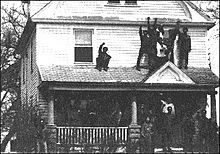Black History Month – Dr Day Gardner
Today at 4 pm on WCUW 91.3 FM .. live stream on TuneIn

Joining us on today’s Radio Pride will Dr Day Gardner as we kicked off Black History Month…
We’ll be talking about the origin of BHM and what is meant to celebrate.
Dr. Day Gardner, a member of the Project 21 national advisory council, is the president of the National Black Pro-Life Union and an executive member of the Washington, D.C.-based National Clergy Council.
Dr. Gardner has a diverse personal history and a dramatic range of experiences. In 1976, she made history by becoming the first black woman to be named a semi-finalist in the Miss America Pageant — breaking through numerous racial and other stereotypical roadblocks, blazing a trail for others to follow. She has also been a successful businesswoman, particularly as the thematic and interior designer of a $36 million dinner theater and nightclub facility located in the center of Guam’s tourist district.
While in Guam, Dr. Gardner also served as a media consultant for KUAM Broadcasting. She was later an on-air personality and executive producer with African Broadcasting in New York City. More recently, she has been a guest on the Fox News Channel, EWTN Global Catholic Network, Glenn Beck, the Christian Broadcasting Network and other national television networks as well as local programs.
Presently, she is the host of “The Day Report” on Urban Family Talk radio.


Black History Month, also known as African-American History Month in America, is an annual observance here in the United States as well as Canada, United Kingdom and in the Netherlands (as of 2016) where it is known as Black Achievement Month.
It began as a way for remembering important people and events in the history of the African diaspora (di-ass-poor-a) . It is celebrated annually in the United States and Canada in February, and during October in the United Kingdom and the Netherlands.
The precursor to Black History Month was created in 1926 in the United States, when historian Carter G. Woodson and the Association for the Study of Negro Life and History announced the second week of February to be “Negro History Week”.[10] This week was chosen because it coincided with the birthday of Abraham Lincoln on February 12 and of Frederick Douglass on February 14, both of which are dates black communities had celebrated together since the late 19th century
United States: Black History Month (1976)
Black History Month was first proposed by black educators and the Black United Students at Kent State University in February 1969. The first celebration of Black History Month took place at Kent State one year later, in February 1970.[7]
Six years later Black History Month was being celebrated all across the country in educational institutions, centers of Black culture and community centers, both great and small, when President Gerald Ford recognized Black History Month, during the celebration of the United States Bicentennial. He urged Americans to “seize the opportunity to honor the too-often neglected accomplishments of black Americans in every area of endeavor throughout our history”


